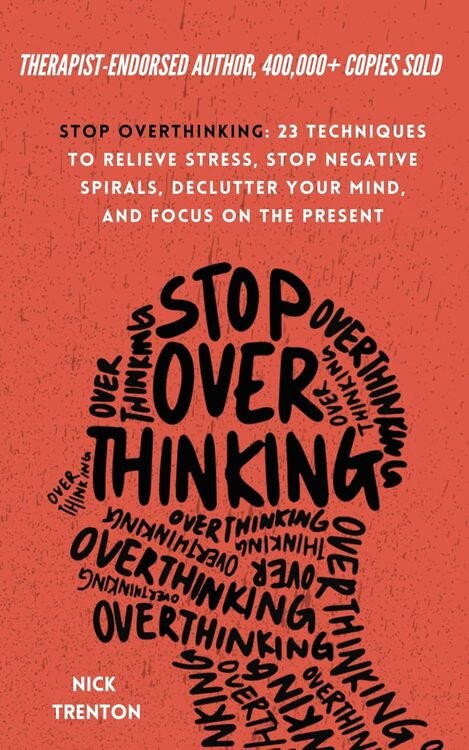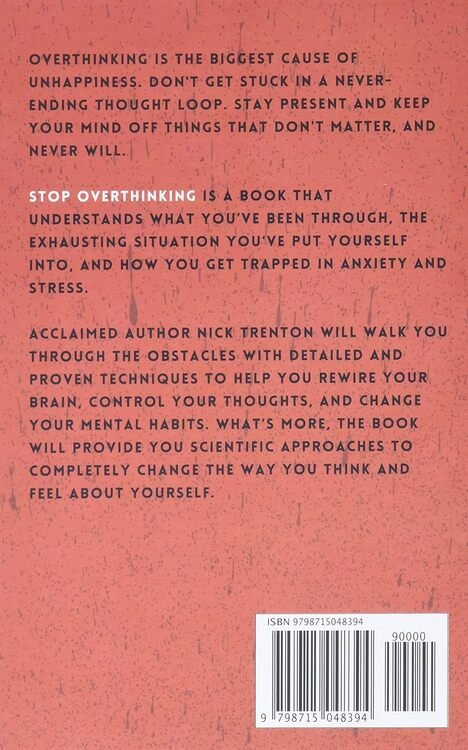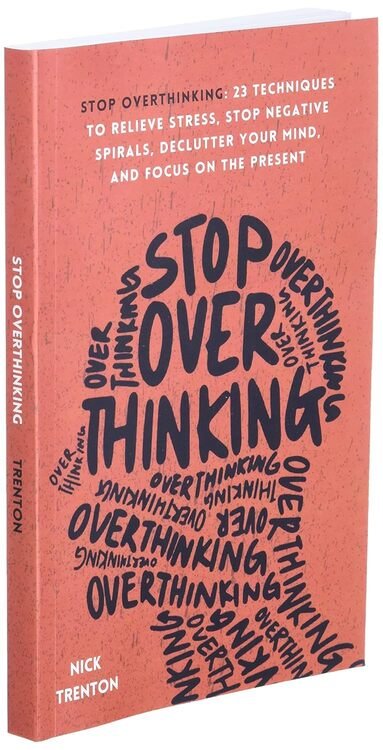How Stop Overthinking by Nick Trenton Can Help You Declutter Your Mind and Find Inner Peace
Stop Overthinking: overthinking is exhausting. It keeps you stuck in a loop of “what ifs” and “should haves,” draining your energy.
If you’ve ever wished for a way to quiet your racing thoughts, Nick Trenton’s *Stop Overthinking:
23 Techniques to Relieve Stress, Stop Negative Spirals, Declutter Your Mind, and Focus on the Present* could be your lifesaver.
This practical guide offers tools to help you break free from overthinking and live with more clarity and peace.
Let’s dive into how this book can help you take control of your thoughts, reduce stress, and truly live in the present.

Why Overthinking is So Damaging
Overthinking feels harmless at first.
You believe you’re just being thorough or cautious. But over time, it becomes toxic.
Trenton explains that overthinking doesn’t solve problems—it amplifies them.
It creates imaginary fears, builds unnecessary stress, and robs you of joy.
I’ll admit, I’m guilty of overthinking. Whether it’s replaying past conversations or imagining worst-case scenarios, my mind often spirals.
That’s why this book hit home for me. Trenton doesn’t just tell you to “stop overthinking”—he gives you practical ways to do it.
What Makes *Stop Overthinking* So Effective?
Trenton’s approach is refreshingly simple.
He doesn’t overcomplicate things, which is exactly what an overthinker needs.
Here’s what makes this book stand out:
1. Actionable Techniques
The book doesn’t drown you in theory.
Instead, it gives you 23 clear, actionable techniques to calm your mind.
2. Relatable Writing
Trenton writes like he’s talking to a friend.
His conversational tone makes the book easy to read and understand.
3. Focus on Real-Life Problems
Every chapter addresses challenges you’ve likely faced—stress, self-doubt, and mental clutter.
The solutions feel relevant and practical.
4. Short and Focused Chapters
Each chapter gets straight to the point.
This makes it perfect for busy people who want quick, effective tips.

Breaking Free from Overthinking: Key Lessons
The book is packed with valuable insights.
Here are some of the key lessons that can transform how you think.
1. Acknowledge the Problem
You can’t fix what you don’t see.
Trenton starts by helping you recognize when and why you overthink.
He explains that awareness is the first step toward change.
This resonated with me.
I hadn’t realized how often I got trapped in my thoughts.
Simply noticing the patterns made a huge difference.
2. Use “Mental Decluttering” Techniques
Overthinking clutters your mind with unnecessary thoughts.
Trenton suggests techniques like journaling and brain dumps to clear your head.
Writing down your worries can help you see them more objectively.
I tried this, and it was surprisingly effective.
Putting my thoughts on paper felt like emptying a heavy backpack I’d been carrying around.
3. Shift Your Focus
Overthinking thrives on focusing too much on yourself.
Trenton encourages shifting your focus outward.
Engage in activities, help others, or immerse yourself in nature.
One exercise involves looking for three new things around you every day.
This simple practice pulls you out of your head and into the present moment.
4. Interrupt Negative Spirals
Negative thought spirals are the worst.
Trenton provides techniques to interrupt them before they take over.
One of my favorites is the “5-4-3-2-1” grounding exercise.
You identify five things you can see, four you can touch, three you can hear, two you can smell, and one you can taste.
This technique is a lifesaver when anxiety creeps in.
It immediately brings you back to the present.
5. Build Better Habits
Overthinking often comes from habits like procrastination or perfectionism.
Trenton suggests creating routines that encourage mindfulness and balance.
For example, starting your day with gratitude or ending it with reflection can set a positive tone.
23 Techniques: A Practical Toolkit
Here are a few standout techniques from the book and how they can help:
– The 2-Minute Rule: If a task takes less than two minutes, do it immediately. This reduces mental clutter.
– Controlled Breathing: Focus on your breath to calm your nervous system and stop your thoughts from spiraling.
– Reframing: Change how you view a situation to reduce its emotional weight.
– Mindful Walking: Pay attention to each step you take. It’s a simple way to center yourself during busy days.
Each technique is practical, easy to try, and doesn’t require a major time commitment.
How to Apply This Book in Your Life
The beauty of *Stop Overthinking* is that it’s incredibly actionable.
Here’s how you can start using its lessons today:
1. Start Small
You don’t need to tackle all 23 techniques at once.
Begin with one or two that resonate most with you.
2. Create a Routine
Incorporate these techniques into your daily schedule.
For example, practice controlled breathing during your morning commute or try a brain dump before bed.
3. Reflect on Your Progress
Trenton emphasizes the importance of self-reflection.
Take time to notice how these practices are improving your mindset and reducing stress.
My Personal Experience
Reading *Stop Overthinking* felt like a lightbulb moment for me.
I realized how much of my energy I’d been wasting on unnecessary thoughts.
The book gave me tools to take back control of my mind.
One technique that really stood out was reframing.
I used to get stuck in negative thought patterns, but now I consciously try to see situations differently.
For example, instead of thinking, “I messed up at work,” I remind myself, “I learned something new today.”
Another favorite was the brain dump exercise.
Writing down my thoughts at the end of the day helped me sleep better and feel less anxious.
Overall, this book wasn’t just helpful—it was empowering.
It reminded me that I have the ability to change how I think.
Why You Should Read This Book
If you’ve ever felt trapped by your thoughts, this book is for you.
It’s practical, relatable, and full of tools you can start using right away.
Trenton doesn’t just tell you to stop overthinking—he shows you how.
His techniques are simple but effective, making them accessible to anyone.
What I love most is that the book doesn’t feel preachy.
It’s like getting advice from a friend who truly understands what you’re going through.

Final Thoughts About Stop Overthinking
Nick Trenton’s *Stop Overthinking* is a must-read for anyone looking to declutter their mind and find more peace.
Its 23 techniques are easy to understand and apply, offering real solutions to everyday struggles.
If you’re tired of being stuck in your head, this book can help you break free.
It’s not about becoming perfect—it’s about learning to live with more presence and clarity.
So, why not give it a try?
Pick up a copy, try a few techniques, and see how they can transform your life.
Trust me, you’ll feel lighter, calmer, and more in control.



